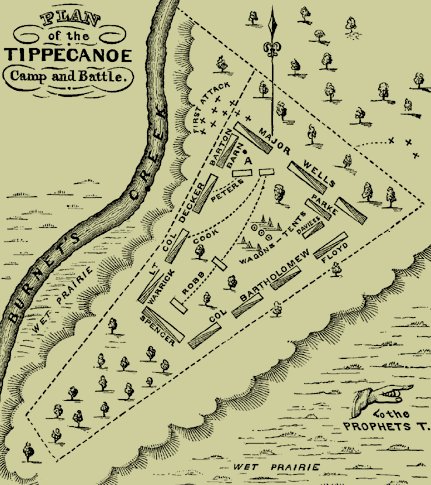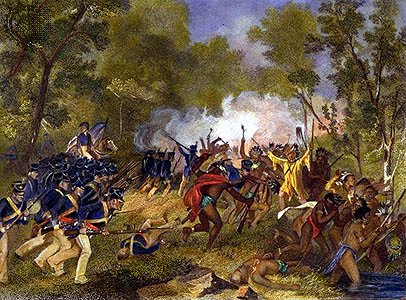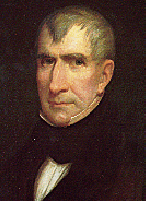 |
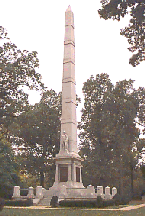
|
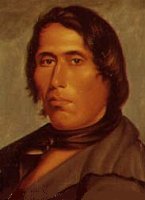 |
 |

|
 |
|
In the late summer and fall of 1811, William Henry Harrison, then Governor of the Indiana Territory, organized a military expedition against the increasing menace of the federation of Indian tribes being formed by the Shawanee brothers, Tecumseh and Elskatawwa-The Prophet. With the Prophet’s Town as his objective, General Harrison marched from Vincennes at the head of a small army of about one thousand men. General Harrison met with representatives of the Prophet on November 6th 1811, when he arrived at Prophet’s Town, and told them of the demands he brought in the name of his government. General Harrison was to meet with the Prophet and his council the next day about the demands of the government. General Harrison then set up his encampment on a ridge about a mile northwest of Prophet’s Town. Fearing the cunning and treachery of the Prophet, General Harrison placed his troops in battle formation , instructed his men to sleep fully clothed, and assigned a large detail of men for sentinel duty. On the morning of November 7th 1811, after 4 o’clock AM, the camp was attacked by the Prophet. After a fierce battle, General Harrison and his army defeated the Prophet’s Indian confederation, and all but ended the Indian wars in the midwest. |
|
The following account of the battle of Tippecanoe is taken from the official dispatch sent by General Harrison to the secretary of war, on the 18th of November, eleven days after the battle: |
|
"I had risen at a quarter after four o'clock, and the signal for calling out the men would have been given in two minutes, when the attack commenced. It began on the left flank; but a single gun was fired by the sentinels, or by the guard in that direction, which made not the least resistance, but abandoned their officer and fled into camp; and the first notice which the troops of that flank had of the danger, was from the yells of the savages a short distance from the line; but, even under these circumstances, the men were not wanting to themselves or to the occasion. Such of them as were awake, or were easily awakened, seized their arms and took their stations; others, which were more tardy, had to contend with the enemy in the doors of their tents. The storm first fell upon Captain Barton's company, of the Fourth United States Regiment, and Captain Guiger's company of mounted riflemen, which formed the left angle of the rear line. The fire upon these was excessively severe, and they suffered considerably before relief could be brought to them. Some few Indians passed into the encampment near the angle, and one or two penetrated to some distance before they were killed. I believe all the other companies were under arms, and tolerably formed, before they were fired on. The morning was dark and cloudy. Our fires afforded a partial light, which, if it gave us some opportunity of taking our position, was still more advantageous to the enemy, affording them the means of taking a surer aim. They were, therefore, extinguished as soon as possible. "Under these discouraging circumstances, the troops (nineteen-twentieths of whom had never been in an action before) behaved in a manner that can never be too much applauded. They took their places without noise, and with less confusion than could have been expected from veterans placed in a similar situation. As soon as I could mount my horse, I rode to the angle that was attacked. I found that Barton's company had suffered severely, and the left of Guiger's entirely broken. I immediately ordered Cook's company, and the late Captain Wentworth's, under Lieutenant Peters, to be brought up from the center of the rear line, where the ground was much more defensible, and formed across the angle, in support of Barton's and Guiger's. My attention was then engaged by a heavy firing upon the left of the front line, where were stationed the small company of United States riflemen (then, however, armed with muskets), and the companies of Baen, Snelling and Prescott, of the Forth Regiment. "I found Major Daveiss forming the dragoons in the rear of those companies, and understanding that the heaviest part of the enemy's fire proceeded from some trees about fifteen or twenty paces in front of those companies, I directed the major to dislodge them with a part of the dragoons. Unfortunately, the major's gallantry determined him to execute the order with a smaller force than was sufficient, which enabled the enemy to avoid him in the front and attack his flanks. The major was mortally wounded, and his party driven back. The Indians were, however, immediately and gallantly dislodged from their advantageous position, by Captain Snelling, at the head of his company. "In the course of a few minutes after the commencement of the attack, the fire extended along the left flank, the whole of the front, the right flank and part of the rear line. Upon Spencer's mounted riflemen, and the right of Warrick's company, which was posted on the right of the rear line, it was excessively severe. Captain Spencer, and his first and second lieutenants, were killed, and Captain Warrick mortally wounded. Those companies, however, still bravely maintained their posts; but Spencer's having suffered so severely, and having originally too much ground to occupy, I reinforced them with Robb's company of riflemen, which had been driven, or, by mistake, ordered from their position in the left flank, toward the center of the camp, and filled the vacancy that had been occupied by Robb with Prescott's company of the Fourth United States Regiment. My great object was to keep the lines entire -- to prevent the enemy from breaking into the camp, until daylight should enable me to make a general and effectual charge. With this view I had reinforced every part of the line that had suffered much; and as soon as the approach of morning discovered itself, I withdrew from the front line Snelling's, Posey's (under Lieutenant Allbright) and Scott's, and from the rear line Wilson's companies, and drew them up upon the left flank; and, at the same time, I ordered Cook's and Baen's companies -- the former from the rear, and the latter from the front line -- to reinforce the right flank, forseeing [sic] that, at these points, the enemy would make their last efforts. Major Wells, who commanded on the left flank, not knowing my intentions precisely, had taken the command of these companies -- had charged the enemy before I had formed the body of dragoons with which I meant to support the infantry; a small detachment of these were, however, ready, and proved amply sufficient, for the purpose. The Indians were driven by the infantry at the point of the bayonet, and the dragoons pursued and forced them into a marsh, where they could not be followed. Captain Cook and Lieutenant Larrabee had, agreeably to my order, marched their companies to the right flank and formed them under fire of the enemy; and, being then joined by the riflemen of that flank, had charged the Indians, killed a number, and put the rest to precipitate flight. "The whole of the infantry formed a brigade, under the immediate orders of Colonel Boyd. The colonel, throughout the action, manifested equal zeal and bravery in carrying into execution my orders -- in keeping the men to their posts, and exhorting them to fight with valor. His brigade-major, Clarke, and his aid-de-camp, George Croghan, Esq., were also very serviceably employed. Colonel Joseph Bartholomew, a very valuable officer, commanded, under Colonel Boyd, the militia infantry. He was wounded early in the action, and his services lost to me. Maj. G. R. C. Floyd, the senior officer, of the Fourth United States Regiment, commanded immediately the battalion of that regiment, which was in the front line. His conduct, during the action, was entirely to my satisfaction. Lieutenant-colonel Decker, who commanded the battalion of militia on the right of the rear line, preserved his command in good order. He was however, but partially attacked. I have before mentioned to you that Major-general Wells, of the Fourth Division of Kentucky Militia, acted, under my command, as a major, at the head of two companies of mounted volunteers. The general retained the fame which he had already acquired in almost every campaign, and in almost every battle which has been fought with the Indians since the settlement of Kentucky. Of the several corps, the Fourth United States Regiment, and the two small companies attached to it, were certainly the most conspicuous for undaunted valor. The companies commanded by Captains Cook, Snelling and Barton; Lieutenants Larrabee, Peters and Hawkins, were placed in situations where they could render most service, and encounter most danger; and those officers eminently distinguished themselves. Captains Prescott and Brown performed their duty, also, entirely to my satisfaction, as did Posey's company of the Seventh Regiment, headed by Lieutenant Allbright. In short, sir, they supported the fame of American regulars; and I have never heard that a single individual was found out of line of his duty. "Several of the militia companies were in no wise inferior to the regulars. Spencer's, Guiger's and Warrick's maintained their posts amid a monstrous carnage -- as, indeed, did Robb's, after it was posted on the right flank. Its loss of men (seventeen killed and wounded), and keeping its ground, is sufficient evidence of its firmness. Wilson's and Scott's companies charged with the regular troops, and proved themselves worthy of doing so. Norris' company also behaved well. Hargrove's and Wilkin's companies were placed in a situation where they had no opportunity of distinguishing themselves, or, I am satisfied, they would have done it. This was the case with the squadron of dragoons also. After Major Daveiss received his wound, knowing it to be mortal, I promoted Captain Parke to the majority, than whom there is no better officer. My two aids-de-camp, Majors Hurst and Taylor, with Lieutenant Adams, of the Fourth Regiment, the adjutant of the troops, afforded me the most essential aid, as well in the action as throughout the campaign.
"The arrangements of Captain Piatt, in the quartermaster's department, were highly judicious; and his
exertions on all occasions -- particularly in bringing off the wounded -- deserve my warmest thanks. But,
in giving merited praise to the living, let me not forget the gallant dead. Col. Abraham Owen,
commandant of the Eighteenth Kentucky Regiment, joined me, a few days before the action, as a private in
Captain Guiger's company. He accepted the appointment of volunteer aid-de-camp to me. He fell early in
the action. The Representative of his State will inform you that she possessed not a better citizen, nor a
braver man. Maj. J. H. Daveiss was known as an able lawyer and a great orator. He joined me as a private
volunteer; and, on the recommendations of the officers of that corps, was appointed to command the three
troops of dragoons. His conduct, in that capacity, justified their choice. Never was there an officer
possessed of more ardor and zeal to discharge his duties with propriety, and never one who would have
encountered greater danger to purchase military fame. Captain Baen, of the Fourth United States
Regiment, was killed early in the action. He was unquestionably a good officer and a valiant soldier.
Captains Spencer and Warrick, and Lieutenants McMahan and Berry, were all my particular friends. I
have ever had the utmost confidence in their valor, and I was not deceived. Spencer was wounded in the
head. He exhorted his men to fight valiantly. He was shot through both thighs and fell; still continuing to
encourage them, he was raised up, and received a ball through his body, which put an immediate end to his
existence. Warrick was shot immediately through the body. Being taken to the surgery to be dressed, as
soon as it was over (being a man of great bodily vigor and able to walk) he insisted on going back to the
head of his company, although it was evident that he had but few hours to live." |
